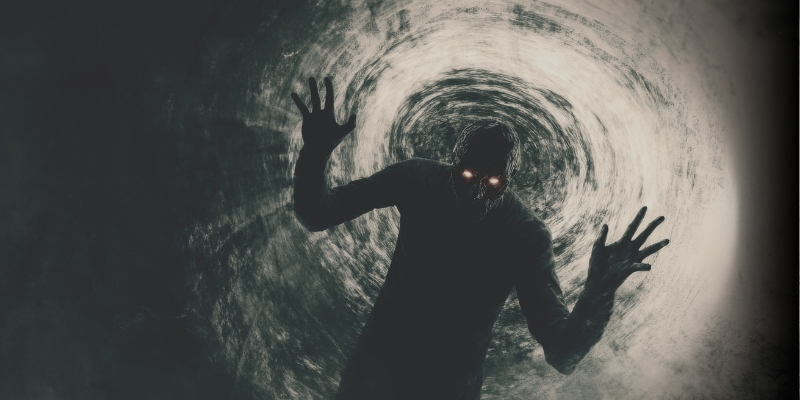As a kid, scared of the dark, my mind conjured elaborate tales of dread, fretting over malevolent figures lurking in the hidden gloom waiting for my vigilance to wane so they might unleash their sinister mayhem. As an adult, I understand these nightly horrors as stand-ins for the churning a child trying to make sense of the confusing, and often deeply upsetting, real world.
But at the time, it felt real: the dark teemed with malignant possibilities, boundless as my imagination. I was not unique. Through the ages children have called out from the dark, pleading for caregivers to save them, to check the inside/underside spaces where monsters lurk, to banish breathing shadows with light.
Children find no joy in the terror. They desperately want it to end. This makes sense. Fear is the emotional companion to physical pain: sensations alerting us to danger or harm, unpleasant by design to grab our attention to act swiftly to stay alive.
So, the question becomes, for readers of dark twisted tales, what weirdness of the human brain compels us to willfully seek out striking terror in our hearts?
As a writer, with a new book that follows a character whose tragic past haunts her so aggressively that it threatens her grip on reality when she returns to the cursed place she most dreads, and as a practicing psychotherapist, I’ve thought a lot about our relationship to fear. Here, I’ll consider three things I think compel this human quirk of inviting fear.
The body’s physiological reaction to fear is a big draw. When we choose to read a book of terror, we are purposefully inducing an event in our nervous systems, setting off our somatic alarm center, designed by nature solely for survival, of fight, flight or freeze. Our hearts races, our breath quickens, limbs flood with a cold shot of adrenaline and cortisol.
Other animals engage behaviors that trigger elements of this system; think of young cubs wrestling one another, or stalking harmless tinier creatures. They do so with a practical purpose: preparing for the day they’ll fight for a mate or hunt to feed.
However, only humans seek the physical sensations of fear for no useful reason: just for the thrill of it. This is possible because of our wonderful, weird brain and its developed pre-frontal cortex. We know what fear does and how it feels, and we intentionally bring it on by making stories that feel intensely, viscerally real. We read and gorge on every conceivable bit of horrid nastiness.
Nose in the pages of some grisly tale, our body’s nervous system, a dutiful servant forever protective of our wellbeing, is duped into doing what it does when sensing danger, allowing us to extract all the good stuff, leaving us breathless on a rush of terrifying abandon without leaving home.
The second thing that compels us toward fear is the psychological/emotional. One reason we read scary stories is to confront our fears. Entering a book, we put ourselves into terrible situations so that we feel, by the end, the conquest of surviving the worst.
As a psychotherapist, I work with clients to move directly into their fears; like injecting a small dose of poison to build a tolerance, engaging fear helps to heal. Mentally returning, often repeatedly, to a traumatic event, allows a person, little by little, to build the emotional capacity to endure what previously sent them into a cascade of panic and tears.
Judging by its popularity, there is a rabid hunger for dark content and its vicarious release. To be alive is to feel, at one time or another, intense emotional pain, helplessness, hopelessness, fear.
With these, our big brains can often be a disadvantage. We hold onto the shivers and shames of things long gone (still mortified when recalling peeing our pants in first grade). We project onto the future fears born in the past (going for a promotion triggers an old self-loathing left by a berating father).
Running from fear is an understandable impulse, yet that is what keeps fear most alive. The interesting thing about the emotional mind is it experiences the imagination as real. When reading a frightening passage in a book, you literally feel yourself in the dark hallway, your heart quickens, your dread rises.
As you read on, and the creature steps out of the dark, you inhale, your mind gripped by pure, icy fear. Words on the page bloom into visions in our brain so real that we are, emotionally and psychologically, truly inside what we are reading.
Engaging fear tells us you are stronger than you think. Enduring fear teaches us you can survive. Like physical thrill-seeking, there is an emotional and psychological euphoria attached to confronting and making it through intense fear.
And finally, willfully subjecting ourselves to fear is rooted in the ineffable thing that makes us human. Call it what you want, the existential, the philosophical, the spiritual, the metaphysical: humans need to look at, sit with, and try to make sense of what we do not understand. Some of our greatest fears come from the unknown, and the human mind is a restless thing; like expanding foam, it moves into the cracks, trying to make sense of it all.
Our earliest stories, fairytales, mythology, religion, are rife with fear. Just as light is defined by dark, fear is the murky shadow twin to hope and life. When something terrible happens, a death, a near miss, often our first reaction, after the shock and grief, is a deeper appreciation of what is important.
We subject ourselves to fear because fear is wise. Fear reminds us of the fragility and beauty of life. Fear helps us remember what we overlook. Fear makes us thankful to be alive.
We subject ourselves to fear because fear is wise.I recently heard the story of the first night that sets in Eden. Having never experienced darkness before, Adam is terrified. He cycles through frantic thoughts about the unsteadiness of the world, that perhaps he is to blame. Eve is equally frightened because she too has never experienced darkness. All they can do is sit in the fear, holding one another, sobbing.
Morning comes, and presumably, they learn something new about the nature of the world. But the point is: fear is ancient, primal, unavoidable. Like the tale of Adam and Eve, imagine early humans experiencing things they had no previous knowledge of, a solar eclipse, an earthquake: the terror that must have grabbed their hearts (and the tales they must have woven)!
We are compelled to feel fear because it connects us, collectively, to something innate and necessary to being alive, and, individually, to our personal, lived histories. Fear is the oldest of feelings felt by our earliest ancestors that, generation after generation, finds a new home in our youngest innocents: a child frightened of the dark.
And deep down, that child never fully leaves.
***


















